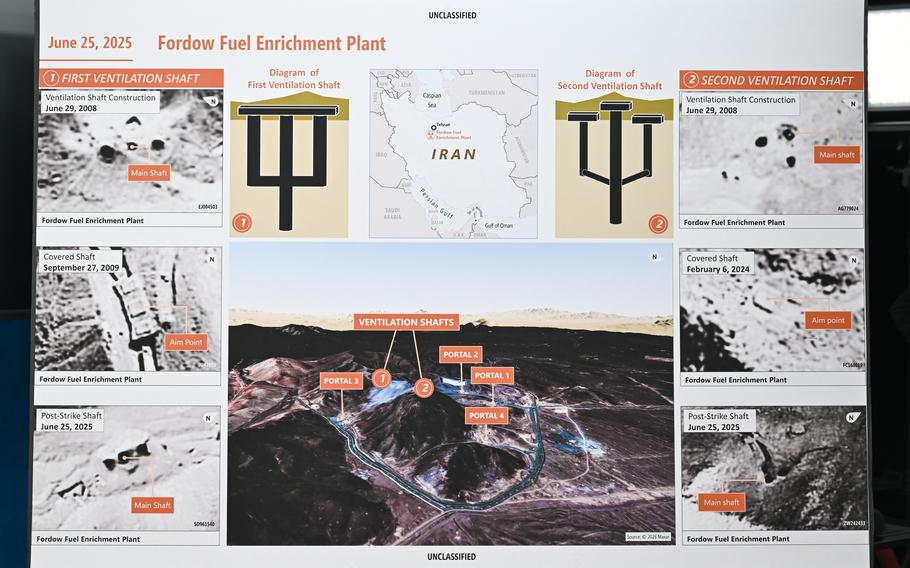
A large graphic with details of the U.S. strike against Iran is displayed at a news briefing on Thursday, June 26, 2025, at the Pentagon in Arlington, Va. (Kashif Basharat/Department of Defense)
President Donald Trump’s decision to bomb Iran is a major surprise. The attack came right after he announced he would decide whether or not to enter the war between Iran and Israel within two weeks.
The Iran-Israel ceasefire that followed is welcome — if durable. Meanwhile, humanitarian catastrophe in Gaza continues.
Before the ceasefire was announced, Iran missiles struck a U.S. military base in Qatar. Less visibly, but even much more ominously, Tehran officials are consulting Russian counterparts. The Soviet Union had powerful influence with Arab nations during the Cold War.
The U.S. bombed Iran’s nuclear sites at Fordo, Isfahan and Natanz, presumably to significant effect. Ordnance used included the GBU-57 Massive Ordnance Penetrator, with a timed fuse. This plus precision guidance and hardened-steel casing permits penetration deep into the earth. The 30,000-pound explosive reportedly can only be delivered by the B-2 Stealth Bomber.
While Israel generally receives the best conventional weapons the Pentagon possesses, Washington has shared neither this bomb nor this aircraft with any foreign government.
The security of Israel along with regional stability have been sustained U.S. foreign policy priorities. Though the interests of our two nations have not always coincided, the partnership endures.
Yet along with great direct support, the U.S. in the past has often been particularly effective in the turbulent region when operating at a diplomatic distance from Israel.
In 1973, military and diplomatic efforts of the Nixon administration were crucial to Israel’s successful defense against a combined attack by Arab states, followed by a ceasefire. Secretary of State Henry Kissinger led de-escalation efforts..
This was followed by major diplomatic agreement. President Jimmy Carter’s determination and discipline achieved the historic 1978 Camp David peace accords between Egypt and Israel.
Early in 1991, President George H.W. Bush and associates led an international coalition that liberated Kuwait from Iraq military occupation. Israel by agreement did not participate in the effort, which included Arab states.
Secretary of State James Baker demonstrated extraordinary energy and dedication in sustained diplomacy that followed. The Madrid conference at the end of October 1991 led to the Oslo accords between Israel and the Palestinians. This in turn facilitated the peace treaty between Israel and Jordan in 1994.
The 1956 Suez Crisis and aftermath remains particularly instructive. President Dwight D. Eisenhower used economic leverage and astute diplomacy to terminate a secretly planned old-style colonial military invasion by Britain, France and Israel to recapture the Suez Canal, which had been nationalized by Egypt’s new military regime, and seize the Sinai Peninsula.
Approximately two years after the Suez disaster engulfed the Middle East region, Eisenhower intervened directly in Lebanon with a sizable military force. Given the volatile nature of the region generally, and armed conflict then taking place in Lebanon, the intervention was regarded with unease.
American troops suffered only one soldier killed by hostile fire. Our forces were concentrated in Beirut’s city center, port and airport.
This rarely discussed incident in U.S. Cold War history should be reviewed any time our forces are to be directly engaged in the explosive, unpredictable Middle East.
Dwight Eisenhower made his name over his long career in logistics, supply and planning, then vast strategic war campaigns. Throughout, he honed political and diplomatic skills.
During his two terms as president, his popularity remained high, yet many journalists, academics and others criticized the alleged “do nothing” president. In fact, as now recognized, he was remarkably active and effective — behind the scenes.
The most significant lesson of this history is these U.S. presidents, and their capable subordinates, demonstrated the importance of sustained, disciplined long-term policy focus. President Trump so far is not known for possessing such skills.
Arthur I. Cyr is author of “After the Cold War.”